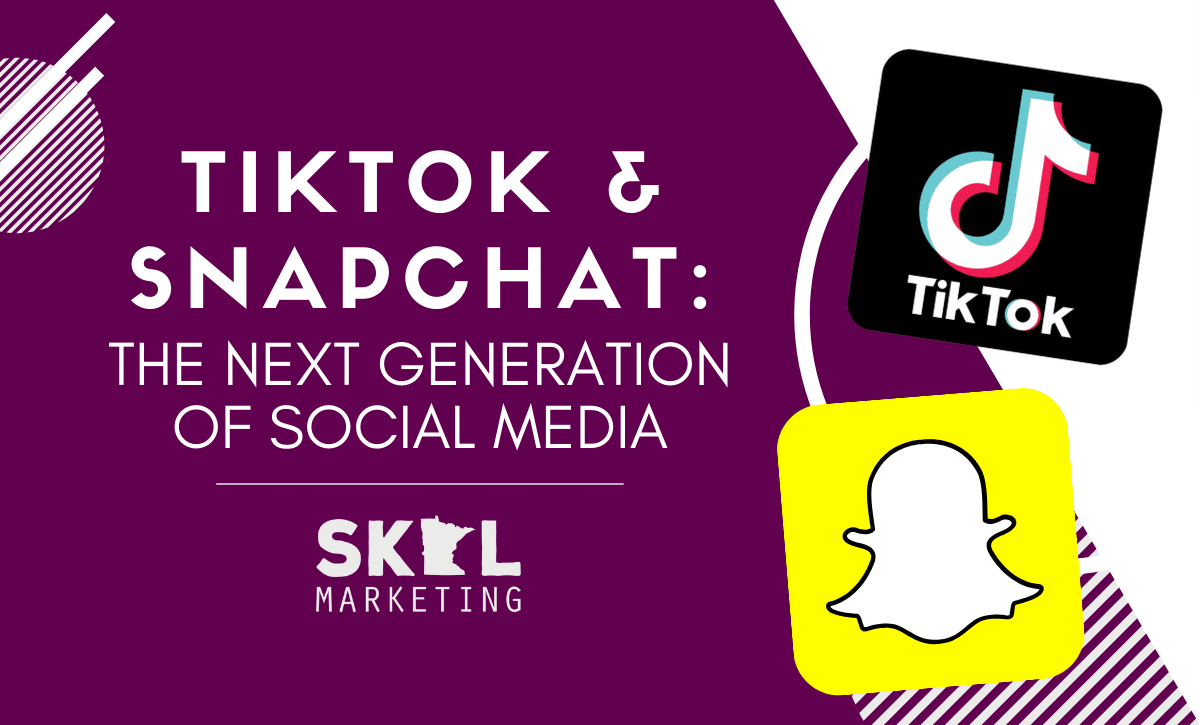Your business is killing it on social media: people love your Facebook posts, all eyes are on your Instagram stories, and your Twitter feed is on fire. But what about the new players? Everyone told you a few years ago that Snapchat was just a flash in the pan and you could ignore it, but it’s still sticking around. And what in the world is TikTok? While you can’t forget about the “old guard” of social media, it’s becoming more and more clear that many businesses need to jump into these new platforms to really get their brand out there.
What are they?
On the face of it, Snapchat and TikTok both seem similar. Both platforms allow users to create and share short custom video content meant to entertain, inform, and more. Both platforms are relatively new in the social media sphere; TikTok released in the United States in 2018 after merging with another social media app, Musical.ly. Snapchat is older, dating back to 2011, but reached peak popularity mid-decade.
However, both apps have distinct differences. Snapchat is most famous for very short (10 second) images and videos that “disappear” upon being viewed, with the platform intended more as a video counterpart to text messaging than a searchable content platform. Snapchat also helped popularize filters and stories, now common elements across most popular social media platforms. TikTok allows for longer content (15 or 60 second videos) with a greater emphasis on video customization, including basic editing tools, musical overlays, and more. TikTok’s “duets” feature allows users to create embedded “responses” to pre-existing videos, allowing for viral trends to manifest easily and spread quickly.
Who are they for?
Simply put, Gen Z! Both Snapchat and TikTok have built their platforms and popularity on this generation that’s just now starting to reach adulthood. Over 40% of TikTok’s users are between the ages of 16 and 24, with 90% of this group using the app daily. 90% of Snapchat’s users are between 13 and 24, and nearly 80% of 18-24-year-olds use the platform. While other demographics certainly are present on these platforms, the main appeal for businesses is in reaching Gen Z, a group that’s more and more commonly viewing Facebook, Twitter, and even Instagram as old-fashioned. With TikTok being birthed (in the US, at least) from a merger with Musical.ly, it’s worth mentioning its importance as an emerging music platform. Many musicians are finding viral success on the platform thanks to the ease of sharing music with new video clips. (Ever wonder how Minneapolis hero Lizzo’s song “Truth Hurts” hit #1 in 2019, despite releasing 2 years earlier? Thank TikTok!)
What’s the best way to use them?
When using Snapchat and TikTok as a business, you can choose to either dive in and make original content, or you can work to spread brand awareness through content generated by other users. Each platform also offers different paid advertising options allowing businesses to spend money to increase their reach on the platform.
- Original Content: While the mechanics for creating content on each platform may be different, the basic content strategies for Snapchat and TikTok are largely similar. Users on both platforms tend to gravitate towards content that’s simple, personable, and casual. This is not the time to mobilize your pro video team and put together the perfectly polished TV spot; that sort of hyper-produced content isn’t what works best on these platforms. Simple, well-shot iPhone videos or pictures; funny or cute subject matter (as always, adorable pets and silly family moments play well!); and community-engagement are your best bets. Find ways to make your branded content feel personal and human, even if the thought of less “professional” content makes you nervous.
- User-Generated Content: This strategy is often a bit more hands-off, and may not even require you to register for the platforms in question (although why would you not?). Taking advantage of user-generated content simply means finding ways to encourage users of these apps to reference or promote your product on the platform. Do you have a product that’s trendy, helpful, cool, or compelling? Ask your customers to share their purchases on Snapchat or TikTok. Both platforms make use of the hashtag (#) cataloging system pioneered by Twitter and Instagram, so if you can get users to share their experiences with your brand using your branded hashtags, word can spread even if you’re not on the platform. Don’t mistake the simplicity of this strategy for ease, however. It takes a strong brand and strong promotional skills to get people talking in a way that feels authentic, and authenticity is prized above all else on these emerging platforms.
- Paid Advertising on Snapchat and TikTok: Of course, if you have money to spend on social media advertising, both platforms are happy to offer ways for you to pay to increase your brand’s presence. Snapchat offers both simple and advanced advertising tools that should be familiar to anybody who’s run paid ads on other social platforms. Snapchat also offers location-based targeting, the Snap Pixel for tracking actions taken on your website, and insights to help you make effective campaign decisions.
Ads are a relatively new part of TikTok’s platform, meaning the app isn’t yet saturated with advertisements, a benefit if your business acts quickly. Again, the ad strategy and targeting should be familiar to anybody who’s done social media advertising, but the ad types are unique. In addition to more standard “in-feed” ads that appear between video views, TikTok gives businesses the opportunity to pay for “brand takeovers” (highlighting your brand on the app for an entire day) as well as “sponsored hashtag challenges,” which prompts a challenge for users to spread your brand’s message and hashtag as part of a potentially-viral campaign.
Lastly, both Snapchat and TikTok offer businesses the chance to create branded image/video overlays (“filters” on Snapchat or “lenses” on TikTok), which can be tied to geolocation. This is a relatively simple way to passively encourage customers to share your branding, especially if you have a physical location.
Need help with social media marketing?
For many businesses, even getting a handle on the basics of social media marketing can be a struggle, let alone staying on top of all the newest emerging platforms. Skol Marketing offers social media management services to help you focus on all the other work you put into running your business successfully. If you’d prefer one-on-one guidance or would like to discuss how our social media management can help you grow and maintain your business’ customer base, please don’t hesitate to contact the local social media experts at Skol Marketing.







